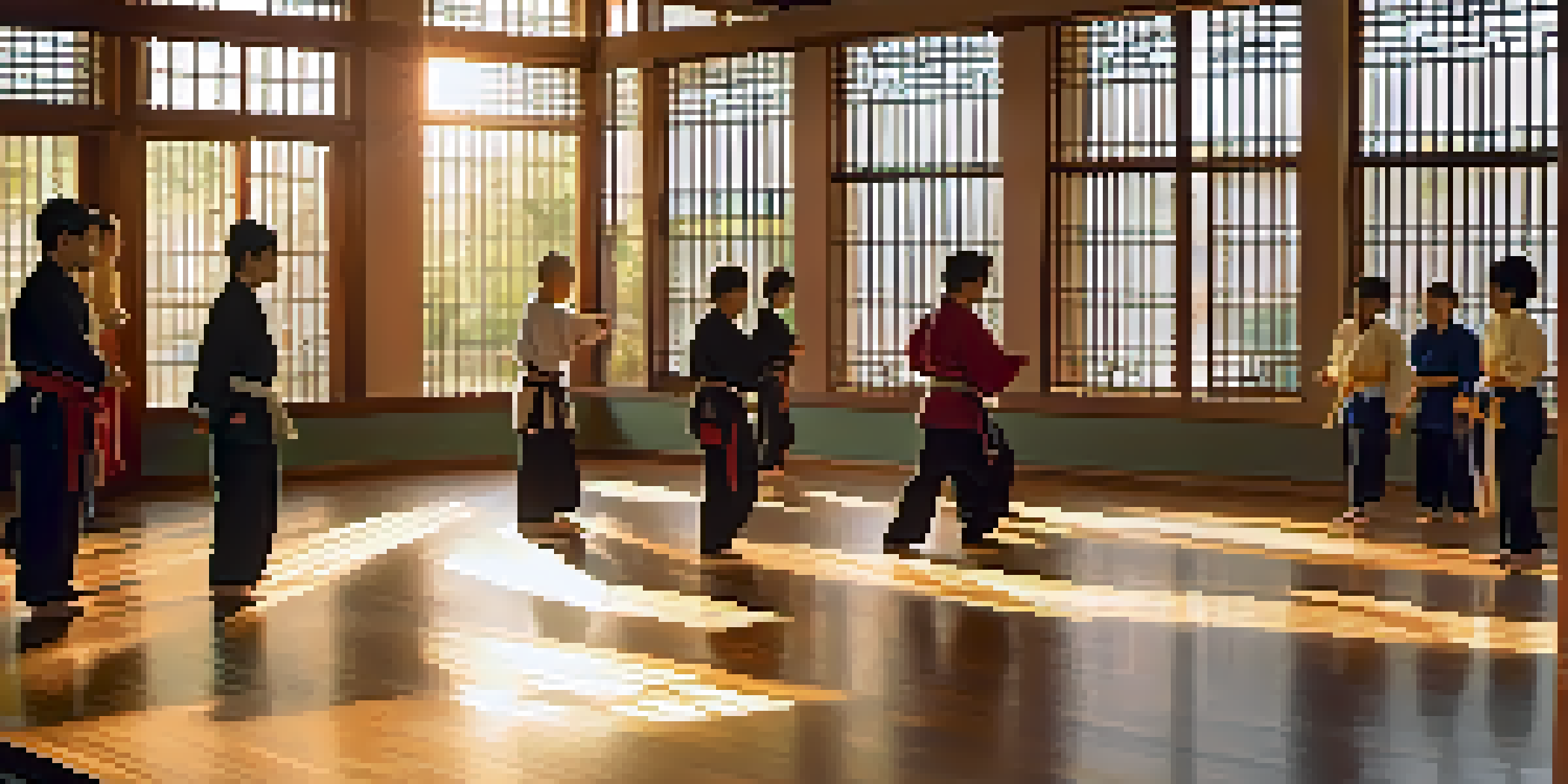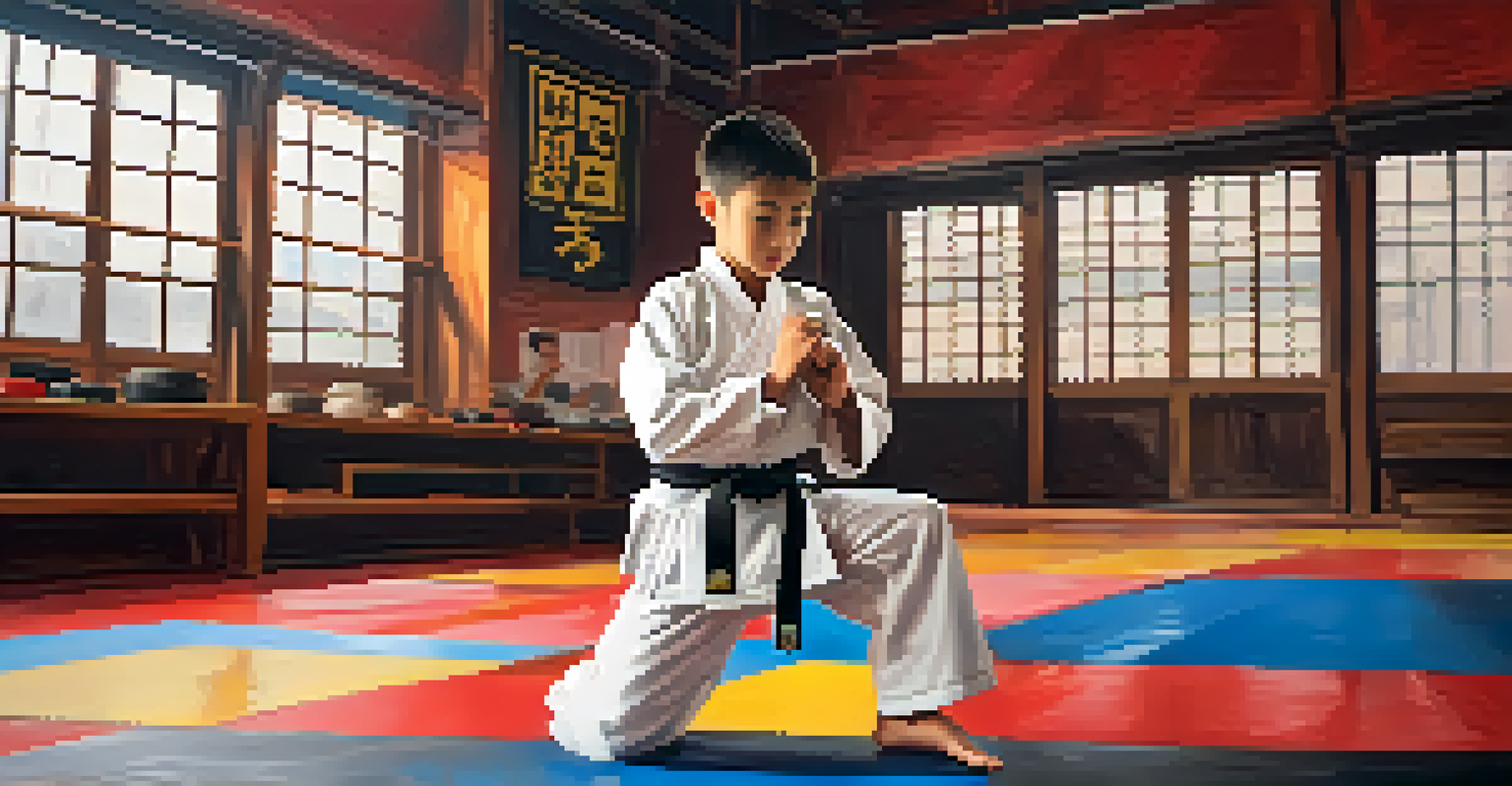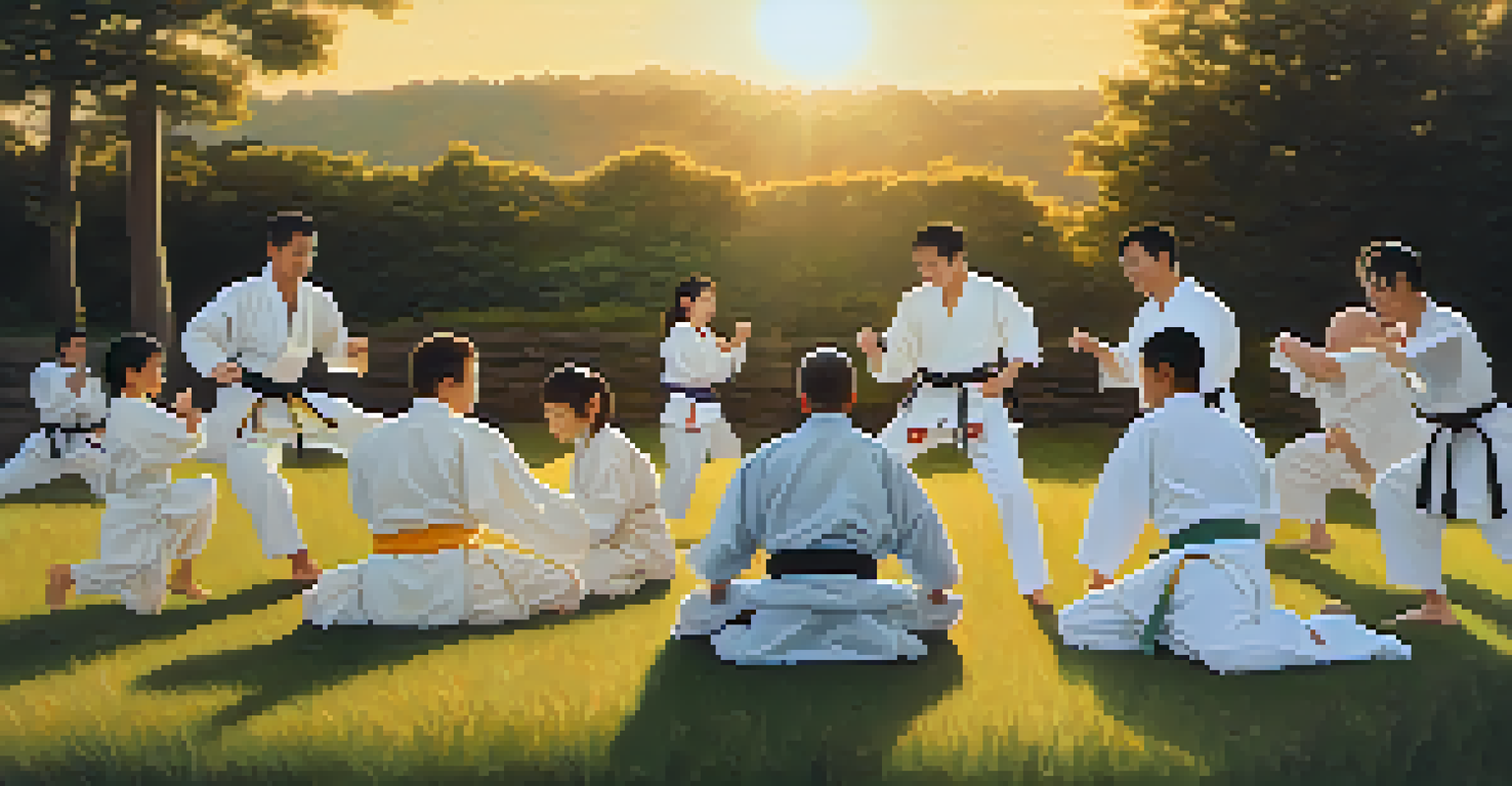Martial Arts as a Tool for Mental Health Awareness Campaigns

Understanding the Connection Between Martial Arts and Mental Health
Martial arts are often seen as physical pursuits, but their benefits extend far beyond just fitness. Engaging in martial arts can significantly improve mental health by fostering discipline, focus, and emotional resilience. Participants often find that the structured environment of martial arts training provides a safe space to explore their emotions and build self-awareness.
The martial arts are ultimately self-improvement and self-discovery.
For many, martial arts serve as a form of therapy, helping to alleviate anxiety and depression. The act of practicing techniques can be meditative, allowing individuals to clear their minds and gain a sense of control over their thoughts. This connection between physical motion and mental clarity is invaluable for those struggling with mental health challenges.
Moreover, martial arts encourage community and support, which are crucial components of mental well-being. Training with others creates bonds that can lead to friendships and a sense of belonging, significantly enhancing one's support network and reducing feelings of isolation.
Martial Arts as a Form of Mindfulness and Meditation
Mindfulness and meditation are key elements in promoting mental health, and martial arts incorporate these practices in unique ways. The focus required during training shifts attention away from stressors, promoting a sense of presence and mindfulness. This engagement helps practitioners develop a deeper awareness of their thoughts and feelings, ultimately contributing to emotional regulation.

Practices like Tai Chi exemplify this connection, blending fluid movements with focused breathing to create a calming effect. Participants often report feeling more centered and relaxed after a session, which can lead to improved emotional stability. This meditative aspect of martial arts can be a powerful tool in mental health awareness campaigns.
Martial Arts Boost Mental Health
Engaging in martial arts fosters discipline, focus, and emotional resilience, serving as a therapeutic outlet for anxiety and depression.
By highlighting the mindfulness techniques found in martial arts, awareness campaigns can encourage individuals to explore these practices as coping mechanisms. This not only fosters a deeper understanding of mental health but also provides practical tools for managing stress and anxiety.
Building Confidence and Self-Esteem Through Martial Arts
One of the most significant benefits of training in martial arts is the boost in confidence and self-esteem it can provide. As individuals learn new techniques and achieve personal goals, they often experience a sense of accomplishment that translates into other areas of their lives. This newfound confidence can be a game-changer for those who may be struggling with self-worth.
In martial arts, we have to learn to channel our energy, which can be a powerful tool for mental health.
The journey of mastering martial arts is filled with challenges, and overcoming these hurdles fosters resilience. Each belt level achieved represents not just a milestone in skill but also an affirmation of personal growth. This process of setting and achieving goals can serve as a powerful metaphor for overcoming life's challenges, resonating well in mental health campaigns.
By integrating stories of personal triumph in martial arts into awareness efforts, campaigns can illustrate the transformative power of confidence. These narratives can inspire others to take action in their own lives, demonstrating that change is possible through dedication and hard work.
Creating Inclusive Spaces for Mental Health Awareness
Martial arts schools can serve as inclusive environments that promote mental health awareness. By welcoming individuals from diverse backgrounds and experiences, these spaces can foster a sense of community and belonging. This inclusivity is crucial when addressing mental health, as it allows individuals to share their experiences and support one another.
Awareness campaigns can leverage the community aspect of martial arts to reach a broader audience. Events like open houses or workshops can provide opportunities for individuals to explore the mental health benefits of martial arts in a welcoming setting. These events can serve as catalysts for deeper discussions around mental health and encourage more people to seek help.
Mindfulness Through Movement
The practices in martial arts promote mindfulness and emotional regulation, helping individuals manage stress and enhance self-awareness.
Furthermore, partnerships between martial arts schools and mental health organizations can enhance the impact of awareness campaigns. By working together, they can create programs that specifically address mental health needs within the community, making martial arts a proactive tool for change.
The Role of Discipline in Mental Health Management
Discipline is a core principle of martial arts, and it plays a significant role in mental health management. The routine and structure that come with regular training can provide a sense of stability, especially for those dealing with mental health challenges. This regularity can help individuals develop healthier habits and coping strategies.
Practicing martial arts requires commitment, and this commitment can translate into other areas of life. As practitioners learn to persevere through difficulties, they develop resilience and a stronger sense of self-control. This growth in discipline can be particularly empowering for those who may feel overwhelmed by their mental health struggles.
Awareness campaigns can highlight discipline as a key to mental wellness, encouraging individuals to find consistency in their lives through martial arts. By framing discipline as a positive force, campaigns can inspire people to take charge of their mental health journey.
Using Martial Arts to Address Youth Mental Health Issues
Youth mental health is a pressing concern, and martial arts can play a crucial role in addressing these issues. Many young people face stressors such as academic pressure and social challenges, and martial arts can provide a constructive outlet for these feelings. Through physical activity, they can release pent-up energy and emotions in a healthy way.
Additionally, martial arts teach valuable life skills such as respect, teamwork, and conflict resolution. These skills are essential for navigating social dynamics and can help reduce bullying and other negative behaviors. By participating in martial arts, young individuals can build confidence and learn to handle difficult situations better.
Confidence and Community Growth
Martial arts training builds self-esteem and resilience while creating supportive communities that combat feelings of isolation.
Awareness campaigns aimed at youth can benefit immensely from incorporating martial arts programs. By promoting these activities, campaigns can provide young people with tools to improve their mental health while also fostering a sense of community and support.
Incorporating Martial Arts into Mental Health Programs
Integrating martial arts into mental health programs can enhance treatment options for individuals seeking support. This combination can provide a holistic approach that addresses both physical and emotional well-being. Practitioners can benefit from the physical activity while also exploring therapeutic techniques within the martial arts context.
Programs that combine martial arts with counseling or therapy can create a safe environment for individuals to process their feelings. This unique blend allows participants to engage in physical movement while discussing their mental health experiences, leading to a more comprehensive understanding of their challenges.

By promoting these integrated programs through awareness campaigns, organizations can demonstrate the effectiveness of martial arts as a tool for mental health improvement. This approach not only raises awareness but also encourages individuals to seek out innovative solutions for their mental health needs.